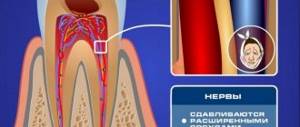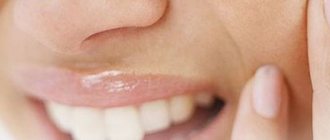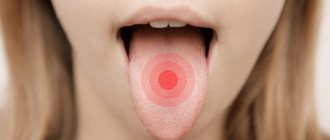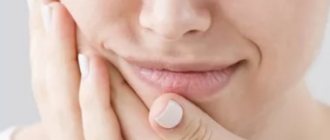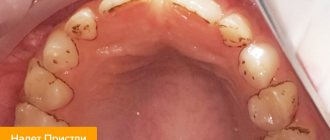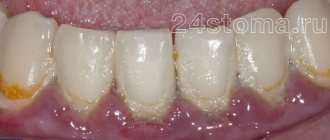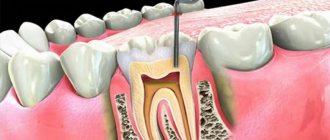- Classic comprehensive hygiene in 3 stages (ultrasound + air-flo + polishing) - 3,500 - 4,600 rub
- Periodontal cleaning of one segment (light) - 2,600 rub.
- Periodontal cleaning of one segment (medium degree) - 3,000 rub.
- Periodontal cleaning of one segment (severe) - 4,000 rub.
- Periodontal cleaning in the area of one tooth - 580 rub.
- Removal of a periodontal tooth during periodontal cleaning - 650 rub.
- Vektor therapy (Vector therapy) - 1st visit (90 min.) - 8,818 rub
- Vektor therapy (Vector therapy) - repeat visit (90 min.) - 7,334 rub
- Vektor therapy (Vector therapy) -1 tooth (20 min.) — 305 rub
Do your gums hurt? This means that you are developing an inflammatory process in your gums or have a painful tooth. When the cause of pain is in the tooth, the pain is local and does not spread to surrounding tissues. If your gums hurt, the cause may be periodontitis. Thus, the gum itself can be the cause of pain or it can serve as a symptom of another process.
When it comes to gum disease, the pain spreads to all or most of the teeth. This picture is especially characteristic of the development of gingivitis and periodontitis.
If you notice that the gums around a tooth or several teeth are swollen, red in color and bleeding, then we are most likely talking about gingivitis. If gingivitis is not cured, the process will go further and periodontitis will develop. If it seems to you that the gums near the tooth are swollen, then you need to promptly contact a periodontist for treatment, which must be carried out responsibly, since periodontitis can develop even if periodontitis is not treated well enough.
With periodontitis, the symptoms of gingivitis appear in a much more intense form, in addition, periodontal pockets begin to fester, and the necks of the teeth become exposed.
The initial stage of inflammation (gingivitis) - pain is felt in all gums. Further, when inflammation develops into periodontitis, pustules appear on the gums, and the pain intensifies around one/part of the teeth. The localization of the pain is explained by a periodontal abscess in the area of one of the periodontal pockets, in this case you may notice how the gums around a specific tooth are swollen. The main reason for the development of diseases of this nature is poor oral hygiene. The soft plaque covering the teeth tends to harden over time into a dense growth on the teeth, forming tartar. It is in the stone that pathogenic bacteria live comfortably, which provoke inflammatory processes in the gums and the appearance of pain. Therefore, it is necessary to both treat the gums and get rid of stone deposits, as well as eliminate carious areas of the tooth.
Possible causes of toothache
Painful sensations can be of a different nature depending on the causes that caused them:
- Pulpitis is the most common cause of acute toothache that occurs in the evening and at night. The disease is characterized by an inflammatory process that develops in dental tissues as a result of long-term caries.
- Periodontitis causes intense pain, especially when biting. During its development, periodontal inflammation occurs, as a result of which the integrity of the connective tissues between the cement of the dental root and the socket bone is disrupted.
- An abscess is another cause of sharp throbbing pain in the gum area. The pathology is accompanied by an accumulation of pus in the alveolar part of the diseased tooth, caused by a bacterial infection.
However, toothache is not always caused by dental diseases. In some situations, the causes may be sinusitis, trigeminal neuralgia, inflammation of the middle ear, and migraine. In any case, before starting treatment, the doctor makes a diagnosis, examining the disturbing tooth and prescribing an x-ray.
What is the reason?
It is generally accepted that the cause of pain is caries. In fact, there are many more sources of pain. Therefore, when a child has a toothache, it is important to understand what caused it:
- pulpitis, periodontitis – inflammation of internal tissues;
- flux - inflammation of the periosteum;
- gingivitis – inflammation of the gums;
- abscess – accumulation of pus in the tissues surrounding the tooth;
- enamel erosion;
- ulcer on the mucous membrane;
- fistulas;
- caries.
With caries, the pain is usually paroxysmal, does not last long - up to several minutes, and occurs when eating cold or hot food. In case of pulpitis, periodontitis - acute, lasts for hours, is not relieved by painkillers, therefore the child needs help immediately.
Filled tooth hurts
Many patients experience tooth pain not before treatment, but after. Do not panic - such a reaction is absolutely normal, since during the process of filling the canals, interference occurs in the tooth tissue. It is enough to wait two or three days, and the pain will go away on its own (taking painkillers is allowed).
However, if the tooth under the filling continues to hurt after seven to ten days, this is a reason to return to the clinic for a second examination, since the cause of the problem may be a violation of the filling technology. Root perforation, poorly cleaned caries, or a filling that does not fit the bite lead not only to pain, but also to the destruction of dental tissue, exposure of the pulp, and involvement of the root part in the pathological process. The longer you delay visiting the doctor, the wider the lesion and the more likely it is to be left without a tooth.
Tooth hurts after nerve removal
If the nerve is removed but discomfort persists, the problem is likely not completely resolved. This means that you need to contact a specialist again. The most common reasons why a treated tooth hurts include:
- Insufficient cleaning of the channels. Sometimes there are more tooth canals than the doctor expects, and if they are not cleaned, the diseased tooth continues to hurt after treatment.
- Insufficient (or excessive) filling. After removing the nerve, the dentist fills the canals with a filling. The difficulty with this procedure is that without x-rays it can be difficult to calculate the amount of material used. As a result, it turns out to be less than necessary, or, on the contrary, it goes beyond the boundaries of the root apex.
- Perforation of the tooth root. This problem most often occurs when using the machine method of passing the canal and leads to filling material getting into the soft tissue.
However, the reason may also be an allergic reaction to filling materials or a periodontal reaction. It is also worth considering that any dental procedure is always a microtrauma that affects nerve endings and entails post-filling pain. In order to confidently draw any conclusions, you need to wait three to five days. Has the pain gone away? It's time to make an appointment with the dentist.
How to get ready for tooth extraction, it’s very scary, do you need advice?
The fact is that this is not a tooth at all, but only a root, because after removal there can be different consequences. How to come in - smile or say that I’m very scared?
It is imperative to decide to have a tooth removed, because this is a necessary procedure to get rid of a tooth that is no longer needed, which is a source of pain and infection.
It is better to immediately tell the doctor that you are afraid. A good dentist will definitely encourage the patient and find the right words.
You can also cheer yourself up mentally. If you are afraid of losing consciousness from fear, then during that period of time when the anesthetic injection has already been given, and the tooth has not yet been pulled out, you need to constantly and vigorously rub your earlobes and ears in general. This will make you feel quite cheerful and avoid lightheadedness and weakness. And it will help to take your mind off unpleasant and frightening thoughts.
And pulling out a tooth now hardly hurts. The main thing is to maintain hygiene in the next few days after the procedure. If the tooth root was large, then after its removal it is better to refuse food not for a couple of hours, as doctors advise, but for at least 4-5 hours. In the following days, after any meal, you should rinse your mouth with any antiseptic: a solution of soda, salt, or a special product from the pharmacy. Then the wound will heal faster without any consequences.
Now in full-fledged dentistry, before visiting a dentist, they let you fill out a form with questions:
whether you are allergic to the medicine,
Do you have heart, kidney, liver, etc. diseases?
Are you afraid to go to the dentist,
Have you ever lost consciousness, etc.
There’s no need to be afraid now, it’s all painless, they give an injection in five seconds and that’s it, well, it takes a minute to pull out a root or tooth.
I was so afraid before that one day, after they lubricated my gums before the injection, I got up from the chair, saying that I would come tomorrow and left. But I came about 1.5 weeks later and the dentist asked my companion to sit with me until they gave me an injection, so that I wouldn’t run away again. First they lubricated the gum, then they pricked it with a thin needle and said that they would just take a look, but in fact they pulled it out, it took all of 5 minutes. I actually did it in a paid clinic.
And keep in mind that on the first day after removal, do not rinse your mouth so that a blood plug does not pop out.
Don’t be afraid, walk confidently, decide for yourself that you are strong and this is nothing for you, now quickly go and finish with this root. Good luck!
Come in and say: I’m afraid, and they will tell you why you shouldn’t do this. Before going on a hike, you can listen to your favorite music or watch something fun (movies, comedy shows). You can bring your girlfriend, boyfriend or parents with you. They will help you calm down in front of the office.
You can also ask the doctor to turn on the music. As a rule, this is the radio: you will listen and think about pleasant things.
After all, in fact, tooth extraction is not scary. They removed the root for me - I didn’t feel anything at all, and my body was so delicate.
Today, technology has reached such a level that removing teeth and roots is painless and safe. Of course, if we are talking about a good clinic with good specialists. Visit qualified dentists.
The attitude is the same - until the root is removed, there will be no aesthetics, in particular, a charming smile. )) What are the consequences, there will be a hole and that’s it. (half an hour in the dentist’s chair and the road to beauty opens.)
It is difficult to give a definite answer here. It all depends on the person’s psychotype and his threshold of sensitivity to pain.
Personally, I always prepare myself that it will really hurt me now, but I have to endure it. And during the procedure I expect severe pain, and when it starts to hurt, I think that it’s not too bad yet, I need to be patient a little longer. And in the end, the procedure ends, but very strong pain was not felt, because I was still waiting for it to become completely unbearable. This helps me, because in general I am a very patient person in life.
And for others, this option, on the contrary, is only worse; it’s better to tune in that it won’t hurt.
Well, if closer to the essence of the issue, then modern painkillers will help you (today is not the Stone Age). They will relieve the pain and you will not feel anything. Tested - it works.
So go ahead with a smile and painkillers and don’t be afraid of anything.
I think everyone is scared. When I need to remove a tooth or get ready for another operation, I act as if I was boarding an airplane. Nothing depends on me, I trust the experience and knowledge of other people, there is no point in being nervous and afraid. Once I had a root removed, but it was a front tooth, I was very afraid, but everything happened very quickly and did not hurt at all. The main thing is, sit down in a chair, relax and do everything you are told - it’s not difficult. Yes, and find a good surgeon.
When you leave the house, drink something soothing. Of course, it's stressful, to be sure. Be sure to tell your doctor that you are afraid. Nowadays dentists are very good psychologists; they will talk and distract you so much that you won’t even notice that the tooth has already been removed.
Complete collection and description: prayer during tooth extraction for the spiritual life of a believer.
>Orthodox icons and prayers
Tooth hurts under the crown
Another question that interests many is why does the tooth on which a crown was installed hurt? There may be several reasons.
- Part of the instrument used to perform the prosthetics remained in the root canal.
- When the canal was expanded or a pin was installed, a perforation formed in the root wall.
- The tooth was poorly prepared for the upcoming prosthetics. For example, the canal was not completely cemented.
- The tooth being treated overheated during grinding, which led to tissue burns and subsequent nerve inflammation.
- The crown is installed poorly (does not fit tightly enough to the gum or tooth surface).
In the worst case scenario, gum inflammation will be added to the toothache, which will require expensive and lengthy treatment. The crown will have to be removed in order to unseal the canal, stop the inflammatory process and carry out the prosthetic procedure again.
Wisdom tooth hurts
It is rare that wisdom teeth have not erupted, and their appearance is often associated with pain. Typically, this is caused by inflammation, so the first step should be to see a dentist and stop the inflammation.
The problem with “eights” can arise for various reasons. As a rule, they erupt at an age when the growth process of the human body is actually completed. During this period, the jaw is fully formed, so when new teeth appear, they have to break through soft and bone tissue. Due to lack of space in the jaw, they can grow incorrectly (to the side, at an angle, horizontally), so they hurt and lead to displacement of the neighboring “sevens”.
Sometimes pain is caused by pericoronitis, an inflammatory process affecting the gum tissue. Its development usually occurs in cases where part of the surface of a growing tooth remains covered with a mucous membrane (the so-called hood), under which food debris and plaque accumulate. This promotes the active proliferation of harmful microorganisms that cause inflammation.
In a situation where a wisdom tooth is erupting, you need to consult a doctor as soon as possible, since delay is fraught with complications. Neglect of one’s own health can result in swelling of the gums and injury to neighboring teeth. Timely help from a dentist will help save teeth from extraction.
My gums hurt and are swollen, what should I do?
If you start to feel pain in your gums, you shouldn’t hope that maybe it will go away on its own; hurry up and see a doctor. It is he who will understand the reason that caused the development of inflammation. Determines the degree of the inflammatory process. Once diagnosed, treatment is very effective and you will soon feel healthy again.
For prevention purposes, we recommend choosing the right brush and toothpaste according to the condition of your teeth and gums. For example, sensitive gums are further damaged by hard bristles, so it is better to choose a brush with soft bristles. It is necessary to practice oral hygiene at least 2 times a day – in the evening and in the morning.
If you follow the recommendations described above, both your teeth and gums will not cause you any discomfort.
Acute and chronic pulpitis
If the patient experiences severe pain, then he is probably faced with inflammation of the nerve. In this case, toothache is severe and acute due to the fact that inflammation directly affects the nerve endings located in the pulp. According to medical statistics, at least 20% of patients come to the clinic with pulpitis.
The causes of the pathology include advanced caries, jaw injuries, tissue burns during dental procedures, and various temperature or chemical irritants. According to the nature of the course, the disease is divided into two types:
- Acute pulpitis can be focal or diffuse and is accompanied by severe paroxysmal pain that occurs spontaneously. Often pain radiates to the temple, ear or jaw area.
- Chronic pulpitis is a long-term and sluggish process in which the gums hurt periodically and not as intensely as in acute cases. Discomfort may increase after eating hot or cold food and decrease after eliminating the irritants.
In the absence of treatment, there is a high probability of not only tooth loss, but also the transition of the inflammatory process to the jaw tissue, as well as the development of sepsis. For this reason, pulpitis should be treated without fail.
How to relieve toothache?
When teeth ache, the dentists of our clinic recommend that their patients take the necessary painkillers and immediately seek advice from a specialist. And the main thing is not to use widely known methods of pain relief, such as: applying ice to a sore tooth, putting an iodine net, disinfecting with vodka or rinsing with sage or applying a compress. All these “tips” can significantly worsen the situation.
However, remember that even if the toothache was relieved, it will soon return, because the cause that caused it is still not eliminated and requires medical intervention.
Toothache during pregnancy
Bad teeth often make themselves known at the most inopportune times - for example, during pregnancy. During pregnancy, a woman's body is especially vulnerable. Lack of vitamins and minerals, hormonal changes, increased acidity inside the oral cavity - all this can contribute to the deterioration of teeth and lead to intense toothache.
Many women during this period refuse to visit the dentist because they fear the negative effects of medications on the baby’s body, but pregnancy does not mean that you should forget about treatment and endure while the tooth aches. Modern dentistry has special anesthetics without the use of adrenaline, and the modern technical equipment of the clinic allows the doctor to determine the length of the canal and carry out its treatment without the use of X-ray diagnostic equipment.
Prayer for toothache in children and adults
When your teeth hurt, you just want to climb the wall, it’s so unbearable. Many people do not realize that prayer for toothache can work better than any painkiller.
The power of prayer is known and confirmed by more than one Orthodox generation. If only it was read from the heart and with faith in healing and help from above. They also treat toothache with prayers: aching and throbbing, weak and acute, periodic and constant. To correctly carry out the sacrament of reading a healing prayer, little is required.
Here are the basic rules:
- Believe in the power of the read prayer text.
- Feel every word of the prayer with your heart.
- It is better to pray in front of images with candles, but if the pain comes suddenly, you can do it in any quiet nook.
- Read the prayer monotonously with the inner mindset that the pain will go away. While reading, you can stroke your cheek with your hand where the tooth hurts.
- The sacred text should be recited until the pain subsides. If you feel like sleeping, rest. When you wake up, there will be no pain anymore.
Traditional healers advise praying a rinse solution (soda or herbal)
Before the procedure, you will need to read the words of the prayer three times over the prepared liquid.
After relief, you should visit a doctor as soon as possible: sometimes toothache signals other serious problems of the oral cavity (periodontitis, caries, fungal infection, etc.).
Who should I read a prayer for toothache to?
All prayers that heal dental disease are quite simple and short (except for the prayer to the Mother of God). Orthodox people consider the prayers to the Mother of God, Saint Antipas and Matrona of Moscow to be the most powerful and effective. Requests for health to St. Jonah, the Apostle James and St. Lawrence also help.
A healing prayer to the Mother of God is read over the “Quick to Hear” icon.
This picturesque icon (depicting the Virgin Mary with the baby Jesus in her arms) is prayed for healing not only from dental ailments, but also from other, even fatal, diseases. The Most Holy Virgin, as the history of the Athos Monastery tells, promised to intercede before God and her Son for all who would turn to her image (which she called “Quick to Hear”).
Saint Antipas, like no one else, knows what unbearable, irrepressible pain is. During his lifetime, he experienced suffering for preaching Christianity: the pagans executed him by imprisoning him inside a red-hot bull made of copper. In this firebox, Antipas, barely breathing, prayed to the Almighty with a request to grant him an easy death and to give him the ability to save people from the most terrible pains and torments.
They say that when the oven was opened, Antipas’ body was neither burned nor mangled - he seemed to be sleeping.
After his death, the saint truly miraculously removed the pain from everyone who turned to him in prayer.
Prayer to Saint Matronushka helps to weaken and relieve sudden, acute pain that arises in the mouth. Blessed Matrona herself was blind during her life, therefore she knows and understands that illness can cause suffering to a person. She also promised that she would not refuse intercession and help to all those who pray and are sick.
Toothache will subside with prayer only for those who truly believe in miraculous healing. If it does not go away immediately, read the sacred text for three days. Be sure to visit your dentist, even if the pain leaves you.
Other types of protective prayers:
Prayers for toothache: comments
One comment
As a child, when my teeth hurt, my grandmother would read prayers to make them go away. When I was little, I laughed, asked my grandmother to leave me alone and did not believe in all this supposed nonsense. Now I have grown up and I have a son whose teeth often hurt. And I myself already believed in the miracle of prayers, I read a prayer to the Most Holy Theotokos. And I believed in her power, because my child began to suffer less. And no, we not only heal with prayers, but when an attack of pain happens unexpectedly, you try with all your might to help your child.
>Orthodox icons and prayers
Information site about icons, prayers, Orthodox traditions.
Medicines for toothache
The question of treatment is the only one asked by a person suffering from toothache. The situation becomes more complicated if rinsing does not help and the tooth aches. The best solution would be to take medications. However, you need to choose medications with caution - many analgesics have toxic properties and, if used incorrectly, can lead to serious health consequences. Before you start fighting toothache on your own, you need to read the instructions and follow the recommendations given in it.
Do not forget that medications help when a tooth hurts, but the pain-relieving effect does not last long, so if you have regular pain, you should seek help from a dentist.
What medications for toothache should always be in your home medicine cabinet? Telo's Beauty doctors recommend the following drugs:
- “Nise” is considered one of the most powerful analgesics. The drug has proven itself to be a pain reliever within ten minutes, regardless of whether the tooth is just aching or the pulp is inflamed. It can be purchased over the counter and is indicated for inflammation or infection. However, it is important to avoid overdosing and take only one tablet. Over the next six to eight hours, the pain is guaranteed not to return again. However, sometimes Nise has side effects: discomfort in the stomach, skin rash, vomiting. In addition, it is contraindicated for pregnant women.
- Another effective remedy is Ketorol. The product does not affect hormonal levels and helps when the aching tooth bothers you too much. However, it should not be taken by those who have not yet reached the age of sixteen, those with bronchial asthma and nursing mothers. Side effects: dry mouth, dizziness, drowsiness.
If suddenly “Nise” and “Ketorol” did not help, then it is better to consult a doctor.
How to relieve pain if a child has a baby toothache
Before visiting a doctor, it is important to alleviate the baby’s suffering. Painkillers, which are always present in the home medicine cabinet of families with children, are suitable for this. If a 3-year-old child has a toothache, you can give one of these medications in an age-appropriate dosage:
- ibuprofen - the effect occurs after half an hour and lasts 6-8 hours;
- nimesulide - approved from two years of age, valid for up to 12 hours, presented in Nise or Nimesil tablets, however, this remedy is best used on the recommendation of a doctor;
- dental drops – suitable for older children.
Folk remedies for dental treatment
Naturally, toothache did not arise yesterday: pulpitis, wisdom teeth that erupted with difficulty, inflammation and infections - all this tormented people even when dentistry as such did not yet exist. How did previous generations cope with painful sensations, and what should we learn from them?
- For rinsing and baths, you can use pre-dried pumpkin tails.
- Clove oil has an amazing effect in the fight against purulent inflammation. If oil is not available, it is recommended to use clove flowers as an alternative, which you can simply chew for a while.
- Plantain root helps within half an hour.
- Sage, St. John's wort, chamomile and calendula play the role of antiseptics.
- Propolis, known for its biologically active components, has an analgesic effect.
However, over time, modern dentists have proven that most of the presented methods are not only ineffective, but can also cause significant harm to the health of teeth and periodontal tissues. That is why we recommend seeking qualified help from a doctor who, having familiarized himself with the problem and made a diagnosis, will begin effective, and most importantly, painless treatment.
What not to do if you have pain
When teeth hurt, it is so painful that a person tries to get rid of the discomfort by any possible means. However, some folk remedies can only worsen the current situation and lead to serious complications. To avoid adverse consequences, you should adhere to the following rules:
- Water or herbal infusions for rinsing should be warm, but not hot.
- You should not apply a heating pad or hot compress to your cheek, as the thermal effect can lead to activation of the inflammatory process.
- It is not recommended to apply honey to the gums, since sweets can lead to the development of a bacterial infection in the carious cavity.
- You should not lie down all the time - being in a horizontal position increases blood flow to the jaw, so the pain becomes more intense.
What to do if a 6 year old child has a toothache?
Folk remedies can bring temporary relief. The main thing is that they do not cause an allergic reaction (herbs, honey) and do not lead to gum burns (tinctures, garlic). Dosages should be minimal. Children 6 years and older benefit from rinsing the mouth at intervals of 2-3 hours. The solution (not hot) must be kept in the mouth for up to a minute. Suitable for these purposes:
- saline solution (a glass of water + a teaspoon of salt);
- soda solution (a glass of water + half a teaspoon of soda);
- a decoction of chamomile, sage, lemon balm, oak bark, mint or other medicinal herbs.
So, what to do if your child has toothache? First of all, don't panic! Make an appointment with a pediatric dentist. After taking painkillers and rinsing, the baby will feel better. To prevent the situation from getting worse, offer your son or daughter soft or semi-liquid food, do not give anything cold or hot, and ask him to rinse his mouth with warm water after each meal. These measures are quite enough to survive the period until a visit to the pediatric dentist. Keep calm - and it will definitely be passed on to your child!
In what cases is it worth removing a tooth?
Sometimes even the most highly qualified doctors cannot save a tooth. This usually happens when the patient comes to the clinic too late, and the pathology is already so serious that the only solution is tooth extraction. So, in what situations is there no other option?
- Abscess or osteomyelitis. Since a diseased tooth is a source of infection spreading throughout the body, the doctor can only pull it out under local anesthesia.
- Broken jaw. Teeth located on the fracture line should be removed.
- The crown of the tooth is destroyed below the gum level by more than 2 mm.
- Impacted and dystrophic teeth.
- Damage to the tooth wall below the gum level (in such circumstances, movable fragments are removed, after which prosthetic treatment begins).
If toothache haunts you, you need to make an appointment with a specialist as soon as possible. The dentists of the Telo's Beauty clinic are always ready to provide professional assistance and relieve you of discomfort in the shortest possible time.
